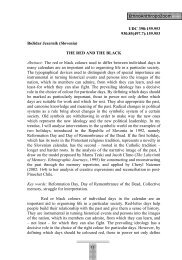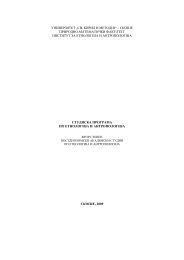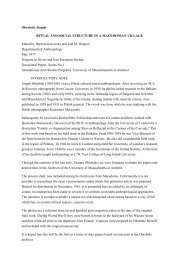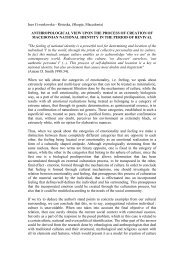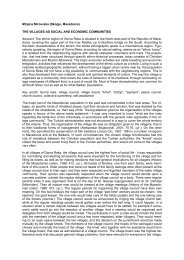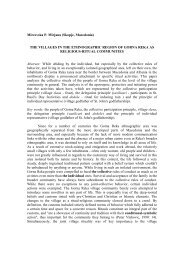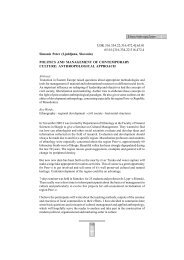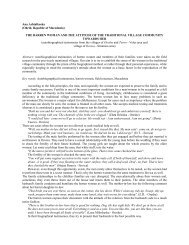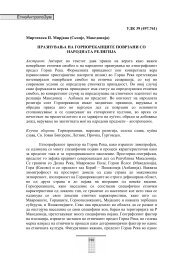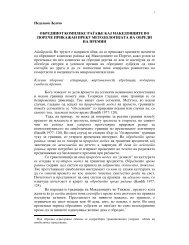Halpern M. Joel, Kerewsky-Halpern Barbara (USA)
Halpern M. Joel, Kerewsky-Halpern Barbara (USA)
Halpern M. Joel, Kerewsky-Halpern Barbara (USA)
Create successful ePaper yourself
Turn your PDF publications into a flip-book with our unique Google optimized e-Paper software.
12345<br />
12345<br />
12345<br />
12345<br />
12345<br />
12345<br />
12345<br />
12345<br />
12345<br />
12345<br />
12345678901234567890123456789012123<br />
12345678901234567890123456789012123<br />
EthnoAnthropoZoom<br />
12345678901234567890123456789012123<br />
12345678901234567890123456789012123<br />
12345678901234567890123456789012123<br />
of view. It is, of course, obvious that the government was of two views on these<br />
matters. That is, on the one hand, they were happy to subsidize and emphasize peasant<br />
arts and performance because these were items which would attract tourists and also<br />
affirm traditional heritage. Importantly, the communist state could both control and<br />
selectively preserve cultural heritages within the defined political framework.<br />
On the other hand, those in government did not want to see their socialist country<br />
portrayed as backward but as a country with a successful socialist system which was<br />
building a modern industrial state. It seems appropriate to point out in this connection<br />
that social-cultural anthropology as a discipline simply did not exist in Macedonia at<br />
this period. Branko Rusi}, then the sole ethnologist at the university, was traditionally<br />
oriented ethnographer and, as Ljupco Risteski has pointed out in his monograph, he<br />
was rather isolated in his efforts. It is, of course, true that in a previous generation, i.e.<br />
before World War II, Milenko Filipovi}, the distinguished Serbian ethnologist, had<br />
taught for a time in the 1930s at the University of Skopje. He was a student of Jovan<br />
Cviji}, the French trained human geographer, who had earlier in the century (at the time<br />
of World War I) helped establish ethnology as a field of study at the University of<br />
Belgrade. Our overt interests in folk costume and customs were thus in harmony with<br />
the traditional ethnological perspective then dominant at that time and we were<br />
influenced in this regard by our contacts with ethnologists in Belgrade.<br />
Finally, it is obvious, but it does need restatement, that writings originally intended<br />
only as informal letters home to parents are, at best, and with difficulty, presented as<br />
some sort of formal academic record. But that context is also their strength. That is<br />
there is a kind of artless quality to these accounts. They were not written to convince<br />
anyone of a particular point of view or to support a specific theoretical perspective.<br />
These notes of travels, while obviously selective and representative of a point of view,<br />
do represent our enthusiasms and pleasure in having the opportunity to spend time<br />
with an engaging and hospitable people who took pride in their heritage. We enjoyed<br />
what we did, we cannot claim more than that although we do hope we learned something<br />
as well.<br />
These notes ere edited by <strong>Barbara</strong> and <strong>Joel</strong> <strong>Halpern</strong>. The bracketed comments<br />
interspersed throughout the text were written in 2004 by <strong>Joel</strong> <strong>Halpern</strong>*. <strong>Barbara</strong> <strong>Halpern</strong><br />
is responsible for much of the original writing but they do reflect what was then in<br />
many cases our joint point of view since the notes were prepared together but written<br />
down by <strong>Barbara</strong>. At the same time there is a significant part of the notes that reflects<br />
<strong>Barbara</strong>’s gender oriented descriptions particularly in the case of the peasant costumes.<br />
<strong>Joel</strong> and <strong>Barbara</strong> <strong>Halpern</strong><br />
Amherst, Massachusetts<br />
April 2, 2004<br />
*All items in parenthesis represented our editorial comments to clarify context for the<br />
reader. The notes are arranged chronically.<br />
125<br />
12345<br />
12345



